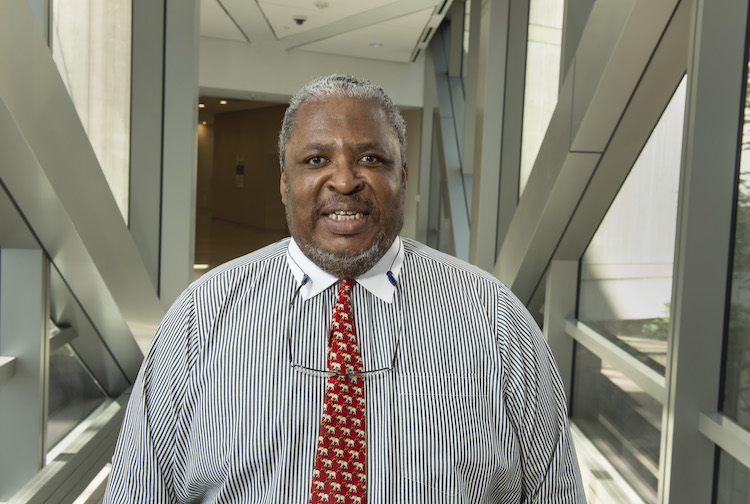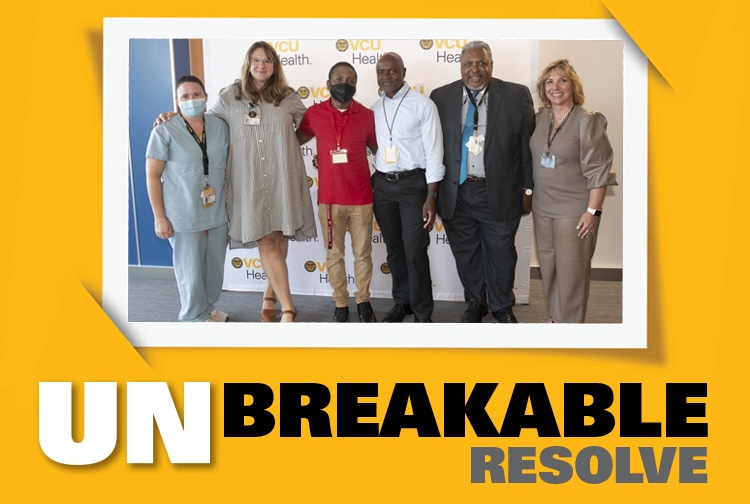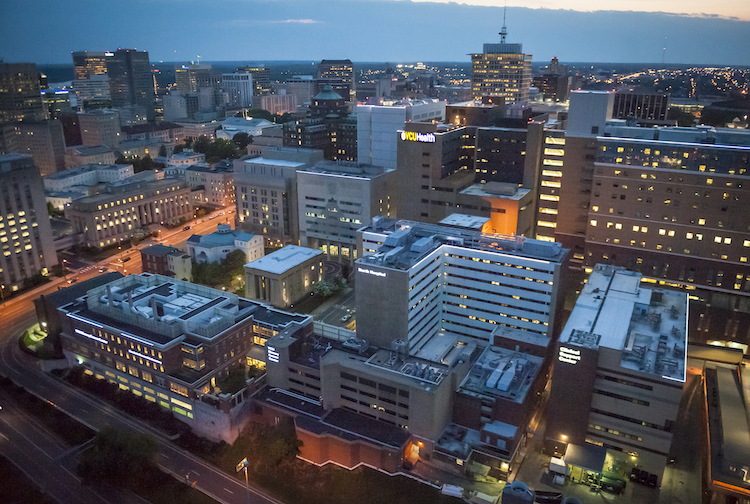
Clinical care for sickle cell enters ‘golden age’ after decades on the fringe
The disease has historically suffered from underinvestment and health care
June 17, 2021
By Paul Brockwell Jr.
MCV Foundation
Sickle cell disease is a genetic disease in which normally round blood cells take on a crescent, or “sickle,” appearance. Because of their abnormal shape and rigidity, sickle cells have a difficult time passing through the body’s tiny blood vessels. By blocking blood flow, the abnormal cells prevent oxygen and vital nutrients from reaching organs and tissues. Tissue damage, severe recurrent pain, strokes, organ damage and other serious complications result.
In the United States, most people with sickle cell disease are of African ancestry or identify themselves as Black. However, sickle cell disease can occur in people of Hispanic, southern European, Middle Eastern or South Asian backgrounds.
Scientists believe the sickle cell gene arose in Africa as a means of protecting humans against malaria. As a result, many people who have sickle cell disease are of African descent. As authors of a New England Journal of Medicine opinion piece stated in November 2020, because many of these individuals with African ancestry are Black, the majority of individuals with sickle cell face the challenges not only of sickle cell disease but also of structural racism in America.
About 100,000 people in the United States have sickle cell disease, making it the most common inherited blood disorder:
- About 1 in 13 Black or African American babies is born with the sickle cell trait.
- About 1 in 365 Black or African American babies is born with sickle cell disease.
Millions of people around the world are born with sickle cell disease.
For years, the medical community in the U.S. has neglected people with sickle cell disease. This has not been the case with VCU Health.
Sickle cell disease is the perfect example of a “disparity” disease —one that is underfunded and undertreated due to historic biases toward race and ethnicity.
For example, cystic fibrosis affects less than half the number of people with sickle cell but receives 3.5 times the funding from the National Institutes of Health and 440 times the funding from national foundations.
Until the 1980s, many doctors simply threw up their hands when it came to sickle cell disease, telling parents not to bother making life plans for their children, as they likely wouldn’t live long past their 20th birthday. Those lucky enough to survive were told there was little therapy other than opioids, which doctors dispensed frugally. This left many patients in agonizing pain on a daily or near daily basis.
On the MCV Campus, a five-decade history of outreach and research has made VCU Health a leader in sickle cell disease.
Virginia Commonwealth University was one of the first 19 institutions in the U.S. to be awarded federal funding for a sickle cell disease outreach program. The program included the state’s first effort at newborn screening for sickle cell, said Wally Smith, M.D., the Florence Neal Cooper Smith Professor of Sickle Cell Disease at VCU and medical director of the adult sickle cell program at VCU Health. Florence Neal Cooper Smith and Robert Scott, M.D., started the program and a clinic in 1972 in the face of overwhelming opposition, Smith said.
“They were swimming upstream the whole time. Now people look to us as authorities in this area. We are clearly one of the top 10 centers in the country — whether you measure by number of patients, funding from the federal government or industry, or research productivity.”
Thanks to groundbreaking research and advances in care, sickle cell children are now surviving well into adulthood, with a median age of 42 to 47 as of several years ago. This is likely longer now. The resulting adult population growth underscores the need for new investment in research and patient care for this expanding, new population.
Smith directs VCU Health’s Adult Sickle Cell Medical Home, whose care team serves VCU Health’s entire sickle cell patient population. This population totals nearly 700 — three times as many as when Smith arrived on the MCV Campus in 1991. VCU Health currently serves sickle cell patients from across Virginia, intentionally reaching and educating patients and providers as far away as the Eastern Shore.
A professional calling leads to great strides in sickle cell disease care, but much work remains.
Care for people with sickle cell disease remains poor in many parts of the U.S., which in turn leads to a higher need for acute care and hospitalizations. That’s the professional challenge and calling Smith has been pursuing since 1984.
“There’s a whole generation of Americans who don’t remember the days when sickle cell patients were not living to adulthood. They don’t understand how much we have had to go through to get care to where it is today,” Smith said.
Smith’s work falls into three main categories:
- Developing and testing new treatments
- Understanding and removing barriers to care to improve outcomes
- Advocating with policymakers at the local, state and national level to achieve equity in funding and equitable lifespans for adults with sickle cell disease
In addition to his clinical duties, Smith consults on a drug development project based at the VCU School of Pharmacy. He is working with Martin K. Safo, Ph.D., a professor in the school’s Department of Medicinal Chemistry, to improve the oxygen-carrying capacity of red blood cells in sickle cell patients and prevent the blood cells from acquiring the life-threatening sickle shape.
“This is a team effort,” said Safo, who has been working on drug discovery for sickle cell for almost 30 years. “We have spearheaded global efforts over the past four years to develop new compounds to treat sickle cell disease with partners like Dr. Osheiza Abdulmalik at the Children’s Hospital of Philadelphia and King Abdulaziz University in Jeddah, Saudi Arabia.”
“We have a lot of hope that these therapies will be a huge benefit and can be added to our arsenal of potential tools,” Smith said. “It's very encouraging.”
In fact, Smith believes sickle cell research and care have entered what he calls a “golden age.”
“Interest is on the uptake. Investment is on the uptake. The pharmaceutical industry has 40 drugs in the pipeline — there was nothing near 40 drugs in the pipeline 10 years ago,” Smith said. “There are four drugs on the market, whereas there was one drug on the market 10 years ago.”
Sickle cell disease has traditionally controlled patients’ lives, Smith said. Now he hears patients say, “I have sickle cell disease. Sickle cell disease doesn’t have me.”
“If the disease has you, it’s controlling you. It’s controlling your life,” Smith said. “Every waking moment you’re thinking about it. You don't have a life outside of going to the doctor. You don't have a life outside of being in pain and being in the hospital and taking pain medicines. We are looking to help people get away from that and think about, ‘When's my next breakthrough? When's my wedding? When's my kid coming? When's the new job starting? What about school? Can I do that?’ We'd love to see patients make big strides in life just like anybody else.”
Advances in research, services and treatment not only benefit the patients but save money as well. With patients managing their disease better and avoiding hospitalizations and emergency department visits, the Adult Sickle Cell Medical Home in its first year saved VCU Medical Center over $1 million, Smith said. “Over two years, it saved nearly $2.5 million.
“The patients were better satisfied because they didn't have to come to the hospital as much. The hospital was happier because the patients weren't in our emergency departments as much. The insurers were happy — they didn't have to pay as much for the care. It was a triple win for everyone,” Smith said. “I would say that the future is bright right now.”
The original version of this article, titled Orphans in Need, first appeared in the summer 2021 issue of NEXT Magazine, a publication of the MCV Foundation.
If you would like to support sickle cell disease research and care on the MCV Campus, please consider making a gift to the Florence Neal Cooper Smith Professorship by contacting Brian Thomas at (804) 828-0067 or by emailing brian.thomas@vcuhealth.org.



